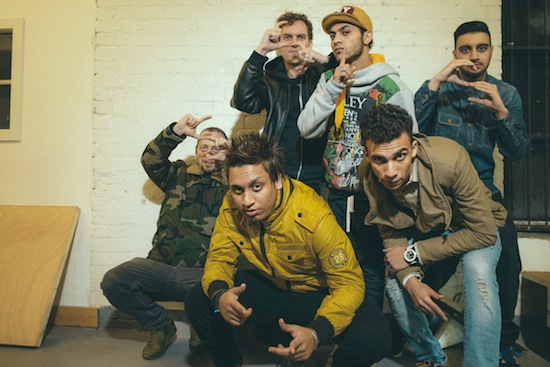All photographs courtesy of Al Overdrive
"It’s actually something I cannot even translate. It’s like… ‘Creating tahini out of the sea, and writing on it.’ Not that it means anything to me, but for them it actually has meaning."
Electro chaabi slang seems to be too much even for our Egyptian translator. Knaka, one of the scene’s protagonists, is reciting some of the lyrics that best demonstrate the hyper-local language he and his fellow MCs use. The translator is laughing nervously. Diesel, Knaka’s collaborator, sits smiling in the minicab passenger seat, filming Brick Lane through the windscreen.
Last week Sadat, Figo, Diesel, and Knaka, four artists from in and around Cairo, travelled to London as part of Cairo Calling, an exchange programme organised by Rinse FM and the British Council. The group are here to record with Kode9, Artwork and Faze Miyake, and in the Rinse studios the priorities of the artists are clear. Electro chaabi instrumentals boom from the monitors, a combination of voluminous kick drum at the bottom end and open bell sounds at the top – two acoustic bookends into which slot synthesised sounds that seem to revel in their own soft-synth cheapness, but which are arranged in restless, complex patterns, at one moment thundering on the off-beat, at the next playing serrated triplets. The melodic elements are built around Eastern scales, but here they are repurposed into something that seems to exist at a previously unknown meeting point between eurotrance and West Coast hip-hop. It comes in waves; the sort of music against which it is impossible to stand still.
Electro chaabi, or mahraganat, as some of the artists prefer, can quite reasonably claim to be the music of young Egypt. The style has its roots in chaabi, meaning ‘of the people’, a working class genre that originated in the 1970s and made use of ‘real life’ lyrics, in contrast with the traditional topics of abstracted love. Electro chaabi, however, was catalysed by the sudden availability of pirated music production software, which producers like Figo learnt to use by following YouTube tutorial videos. The software, they realised, enabled them to produce an entirely new iteration of this street music, fusing Egypt’s recent traditions with Western MCing and production.
Since Egypt’s stuttering revolution, electro chaabi has become a major underground movement. The state censored mass media refuses to play the genre and, until recently, electro chaabi was not welcome in the clubs or hotels. In response, electro chaabi artists began pitching up at weddings, which they promptly turned into Egyptian street versions of all-night free parties. Mahraganat requires only a DJ, an MC and a sound system, making it a cheaper and increasingly popular alternative to the traditional live band. The groundswell of popular support for mahraganat, however, has very rapidly pushed the genre outwards from the streets of El Salam City onto the streets of Cairo, and now onto the streets of the Gulf. Today, the artists say, they play 2,000 capacity ticketed concerts.
Despite the burgeoning popularity of electro chaabi, though, there is a sense that money remains tight for the artists. For better or worse, no real industry has yet developed around this music. Recordings are generally distributed for free (indeed, one of the only paid-for mahraganat records thus far, Sadat and Alaa Fity Cent’s The Best Of…, was released by Dutch-British web label Generation Bass) and, as Sadat tells me, they only "make money from the streets – in weddings and concerts". Their work is now a fixture in popular Egyptian films and, in the West, fees for these ‘syncs’ remain amongst the most important revenue streams for musicians. Extraordinarily, though, the electro chaabi musicians do not get paid for this work. "Movies are relying on them to get exposure," our translator relays. Sadat is explaining, she says, that "their songs are very popular, so if [the film studios] want their movie to really reach everyone, they would use their music.
"He says that the movie industry is making use of them. They rely on marketing the movie through their songs. They are completely ripping them off."
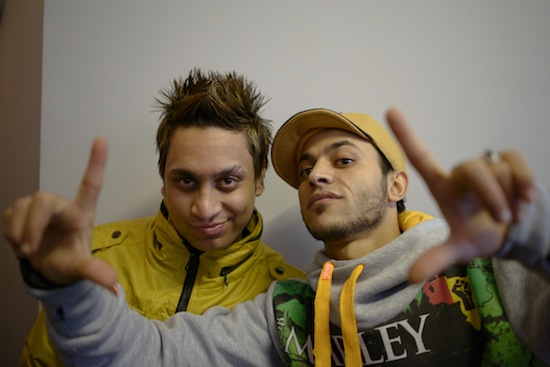
Sadat and Figo say that this is partly because, while the studios are happy to use their music to sell tickets, they have little clout because those with the cash still refuse to treat electro chaabi as ‘real’ music. The artists are "always being ridiculed by the media. They say this is not art. They say that this is just the current phenomena; that it is going to end at some point." That viewpoint is shared even by the organisations set up specifically to protect their rights. The musicians’ syndicate refuses to represent them because, Sadat explains, "they don’t consider [electro chaabi] art in the first place."
When I suggest that the growing popularity of the music could eventually lead to the establishment of a more conventional industry – perhaps, as anachronistic as it might seem, one in which they might choose to sell physical records – Sadat quickly tells me that "it will not work. Everyone listens to music on YouTube." Our translator continues: "He says if he wants people to listen to his music, he would instantly upload it to YouTube and get the most exposure. To put that in conventional ways, like CD, and sell it, that’s confining yourself." Knaka later explains to me that, while those videos were initially not monetised, they now have "a company that gives them money the more views they get."
The British Council, however, wants to strengthen that nascent industry. Cathy Costain, British Council Egypt’s Head of Programmes for the Arts, tells me that as well as recording with British musicians, the Egyptian artists and their management spent some of their time in London with Rinse’s industry contacts. The radio station has, she says, "introduced our Egyptian guests to a number of influential people that they work closely with, in order to provide a more in-depth understanding of current developments in the music industry.
"There is no formal performing rights society in Egypt, or a strong system of management and agents, so more often than not individual artists are also negotiating and collecting fees as best they can." Part of the Cairo Calling programme, Costain says, is about helping the Egyptian musicians "monetise their industry."
And yet a great part of the excitement of electro chaabi can be traced, perhaps, to its culture of sharing. Recordings are made available on sites like Mediafire, rendered in low bit rates in order to facilitate easier transmission across dodgy internet connections. Just as importantly, though, there is a tradition of remixing and repurposing, in which artists seem to be encouraged to produce their own versions of songs, or make amendments. I ask Knaka to what degree he feels ownership over his songs, and whether he is happy with other artists producing their own interpretations. "They feel really proud when someone takes one of their songs and remixes it," the translator explains. "They’re even happier when people add to the song and develop something new out of it."
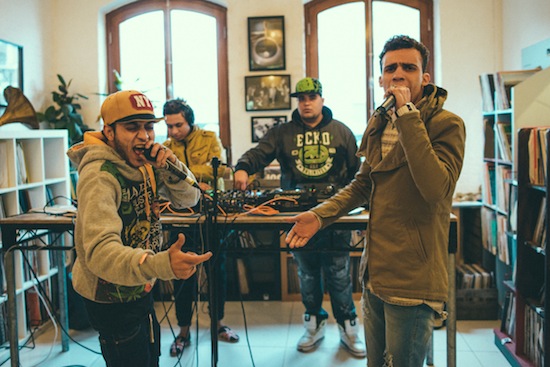
As electro chaabi has become more popular, there has been a suggestion that some artists, including Oka and Ortega, the subjects of a recent documentary about the scene, have toned down their lyrics, while others have remained defiantly controversial. In reality, the situation seems to be more complicated. Sadat becomes animated – angered, even – when I ask about Oka and Ortega, and wonder whether they are concerned about the impact that mainstream success could have on their work. "He says that is wrong information," the translator says, and yet at the same time Sadat recognises that this is a path his career could have taken. "He doesn’t want to do that," the translator continues. "He could have done that from the beginning, but he didn’t want to do it. He says that in the streets people really like and prefer them, because they can relate to the lyrics. It’s not just music to dance to. He says to reach people in the streets you really have to give them that content.
"He says nowadays in Egypt, people have come to realise which artists present which kind of lyrics and which kind of music. It’s well known."
Knaka, on the other hand, says that his lyrics have changed, and that this is a progression with which he is happy. They have "developed", he says, "so that the lyrics reached the upper class people as well." The translator continues: "The upper class really like the music and the beats. At the same time they started developing the lyrics so that the upper class people would actually concentrate on them. They started talking about ideas and stories that are happening, so people became really interested. They are making sure that the language is simple and a bit classy, so that everybody will understand."
There has also been a shift in the sorts of topic that many of the artists tackle. Sadat says that ‘All Our Youth Is Gone’, the first song he was really proud of, talked about drugs. "He noticed that most of the youth in Egypt wake up and they rely on drugs in everything," our translator says. "He was tackling pills in particular, because they’ve had a very bad effect on the youth. His song was tackling this problem, saying how the youth were drowsy, how nobody focuses on anything. He says a lot of kids listen to their music, so it’s good to scare them off that." The more Sadat speaks, though, the more it seems that his lyrics are zooming out, becoming increasingly concerned with the realities of life in a specifically post-revolution Egypt. Indeed, Sadat claims that he and Figo wrote "the first ever song about the revolution." He joined the demonstrations on January 25, 2011, their first day, and, he says, "I went home and I couldn’t sleep. I started writing, and the next morning I went to Figo’s house, and we started composing the song. It was about corruption and killing, and everything that I saw. It was called ‘The People And The Government’, because the revolution was between the people and the government."
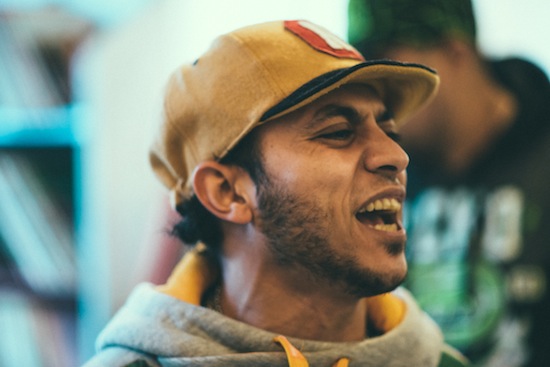
There is heated debate amongst European electro chaabi enthusiasts about whether or not they can be described as political artists. Sadat does not disagree when asked whether he identifies as such. "It depends on what’s going on," he says. The translator continues: "He says it’s a very good way to get people together. If someone is only interested in politics then they would sing political songs for that type of people, and if someone is interested in something else then they are still singing for that type of people. That’s how you bring them together and expose them to different ideas.
"He says he doesn’t want to confine himself and his music. People of different age groups listen to his music, so he has to sing and appeal to each type of person and each type of age group, and not confine himself to only one category of people. This is art, for him – it should reach everyone."
Knaka, meanwhile, speaks proudly about his song ‘The Dream Of Development’. "It was mainly about [how] it’s not important which party the President Of Egypt comes from," he says, "whether it’s from the Brotherhood or from any other party. It doesn’t matter. The important thing is that whoever comes, the people along with the President will develop the country." Sadat and Figo, however, seem less positive about post-revolution life, although no more partisan. As Sadat says, "either my songs and my words reach both types of people, or I don’t sing at all. I don’t want to support one party against the other." The translator continues: "He says he is not happy because the people have always been one in Egypt, but nowadays they are divided. There are people who are pro the constitution, and people who are against the constitution. Each party is very closed-minded, they are not ready to listen to the others, and they are willing to close their eyes to anything bad happening from their side. Nobody is really accepting the others’ ideas, so he is not happy about that. He says it’s a very hot topic at the moment. He couldn’t support either side – he’s not pro the constitution because it means that Sisi would be president, and he is not sure what that would mean – but it would mean that people who died for the revolution have not got their rights back. He cannot also go against people who are voting for the constitution, because they also want the country to be peaceful and stable. He doesn’t really know which side to take, and he thinks it’s too early to judge."
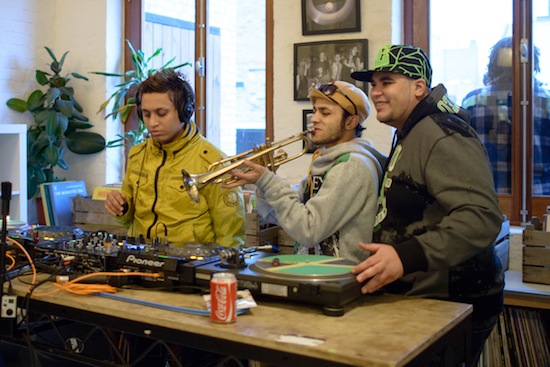
Later, the artists pile into the Vinyl Library, a small room in East London filled with vinyl, for an afternoon edition of Boiler Room. Figo and Diesel share DJing responsibilities, the music propulsive and kinetic even as its low bit rate is betrayed by the sound system. Live, though, it is the MCing that is the real spectacle, and it is Sadat’s that is the most gripping. His glottal-stopped delivery is full of a combination of rage and sex, his eyes alternately crows-footed with anger and light-lidded as he dances around girls in the small crowd. He cannot bear anything but for the crowd to devote their attention entirely to him, dominating the room with convulsive movements, half robotic and half paroxysmal.
After the performance the four lean on a low wall outside, smoking cigarettes and laughing together. Their British counterparts are with them, smiling and chatting happily, even though they share no language. Mahraganat is the music of the Cairo street, but it feels just as at home in London.
Watch this space for an interview with Islam Chipsy

